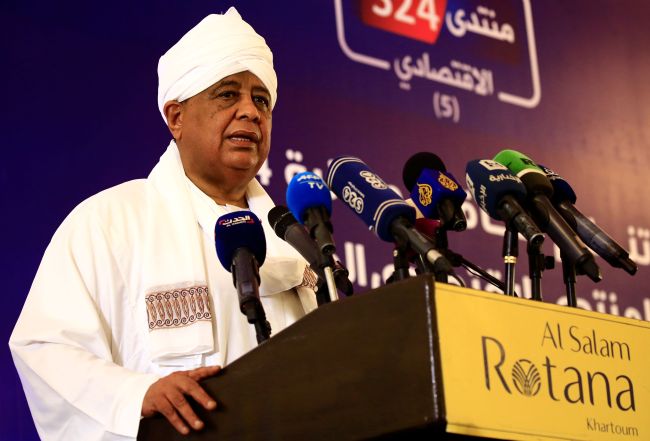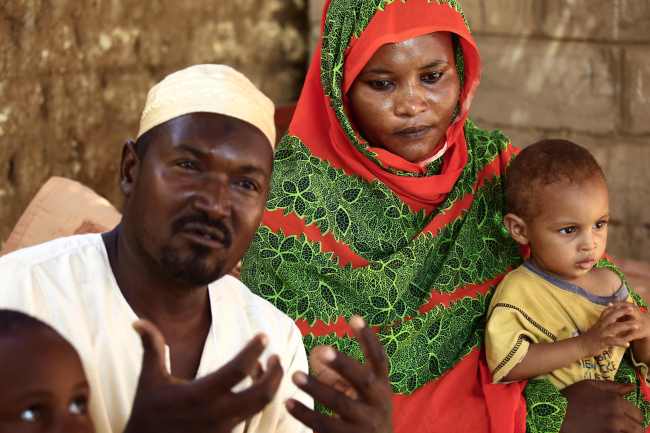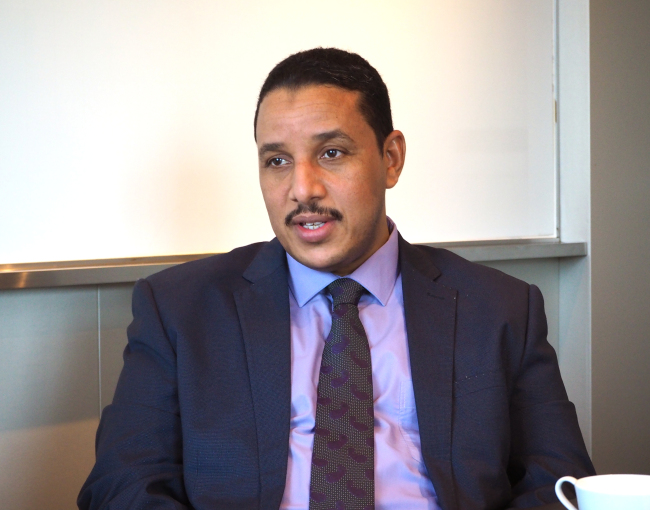The government and people of Sudan welcome the United States’ decision on Oct. 6 to permanently revoke the decadeslong sanctions placed on the country, which is expected to pave the way for its global engagement with renewed energy, according to the Sudanese Embassy in Seoul.
“Sudan welcomes this resolution and considers it an important development in the history of Sudan-America relations and natural outcome of a frank, transparent and constructive dialogue on all issues of mutual concern,” the diplomatic mission said, referring to a statement by Ambassador Garibullah Elkhedir, spokesperson at the Ministry of Foreign Affairs.
“Sudan reaffirms its unequivocal commitment to cooperating with the United States in all bilateral, regional and international matters of mutual concern, especially through measures to preserve international peace and security, counter terrorism and combat irregular migration and human trafficking.”
The country in the Horn of Africa region was branded a state sponsor of terrorism in 1993 by Washington, and a comprehensive set of sanctions was imposed in 1997 for its alleged backing of Islamist militants. In January, Washington partially lifted its sanctions pertaining to the general license for trade and financial transactions. The license was activated in July, allowing business to take place between Sudanese and other national entities.
 |
Sudanese Foreign Minister Ibrahim Ghandour addresses a panel discussion on the impact of Washington's decision to end its 20-year-old trade embargo on Sudan in Khartoum on October 7, 2017, (AFP PHOTO) |
“Today, the United States decided to revoke economic sanctions with respect to Sudan and the government of Sudan under Executive Orders 13067 and 13412, in recognition of its sustained positive actions to maintain a cessation of hostilities in conflict areas in Sudan, improve humanitarian access throughout Sudan and maintain cooperation with the United States on addressing regional conflicts and the threat of terrorism,” said US State Department Spokesperson Heather Nauert on Oct. 6.
She added that the action came about through an intense 16-month diplomatic effort to make progress in these areas.
“The government of Sudan’s actions during the last nine months show that it is serious about cooperating with the United States and has taken significant steps to stop conflict and improve humanitarian access within Sudan, and to promote regional stability.”
Nauert, a former journalist who assumed her post in April, said more progress is needed to fully and sustainably achieve peace in the country and to cooperate with Washington on a range of priorities, including further expanding humanitarian access, improving the country’s human rights and religious freedom practices, and ensuring the government is committed to fully implementing United Nations Security Council resolutions on North Korea.
 |
Sudanese engineer Ahmed Abdallah (L) gestures as he gives an interview with AFP while sitting with his wife Shahinda Adel (R) and their children in their home on the outskirts of the Sudanese capital's twin city of Omdurman on October 2, 2017. With the lifting of Washington's economic embargo on Sudan, imposed in 1997 over Khartoum's alleged support for Islamist militant groups, citizens are looking forward to a brighter future after enduring decades of isolation from Western markets, as economic conditions have remained challenging amid persistent fiscal deficits and high inflation. (AFP PHOTO / ASHRAF SHAZLY) |
The Sudanese Foreign Ministry said removing its name from Washington’s list of State Sponsors of Terrorism -- designated since 1993 -- remains crucial, as well as facilitating the country’s debt relief. Khartoum also expressed appreciation to neighborly countries and organizations that supported the process leading to the embargo’s abrogation, including Saudi Arabia, the United Arab Emirates, Kuwait, Qatar, Oman, Egypt, Ethiopia, the Arab League, the African Union, the Organization of Islamic Cooperation, the African and Arab Parliaments and the Intergovernmental Authority on Development, among others.
Sudan has actively undertaken what has been called the national dialogue process, a platform designed to discuss and harmonize opinions of all stakeholders covering conflict resolution, stabilization of the political system, creation of strong national identity, economic development, enhancing people’s freedom and foreign relations.
In an interview with The Korea Herald in Seoul in early September, Hamid Mohamed E. Momtaz, state minister at the Ministry of Foreign Affairs, said the dialogue has substantially improved the rights and freedoms of various groups and citizens.
By Joel Lee (
joel@heraldcorp.com)
 |
Hamid Mohamed E. Momtaz, state minister at Sudan’s Ministry of Foreign Affairs (Joel Lee/The Korea Herald) |








![[Exclusive] Hyundai Mobis eyes closer ties with BYD](http://res.heraldm.com/phpwas/restmb_idxmake.php?idx=644&simg=/content/image/2024/11/25/20241125050044_0.jpg)
![[Herald Interview] 'Trump will use tariffs as first line of defense for American manufacturing'](http://res.heraldm.com/phpwas/restmb_idxmake.php?idx=644&simg=/content/image/2024/11/26/20241126050017_0.jpg)
![[Herald Review] 'Gangnam B-Side' combines social realism with masterful suspense, performance](http://res.heraldm.com/phpwas/restmb_idxmake.php?idx=644&simg=/content/image/2024/11/25/20241125050072_0.jpg)